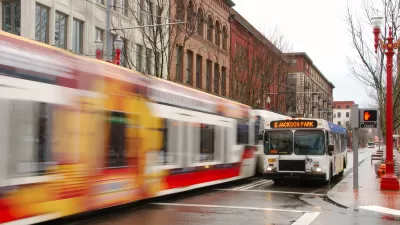Without other dedicated funding sources, U.S. transit agencies likely can’t sustain fare-free programs.

As federal funds that supported some pandemic-era free transit programs wind down, transit agencies must evaluate the effectiveness and sustainability of free fare programs. As Tim Henderson explains in Stateline, free transit rides can be an important lifeline for low-income workers who depend on transit to get to work and access other needs.
Critics of free transit question the effectiveness of making transit free for all riders, including high-income users who could afford to pay fares. Free transit programs may make less sense in cities with more affluent commuters, according to Brian Taylor, a professor at the University of California, Los Angeles and director of the university’s Institute of Transportation Studies. But in many places, transit riders are overwhelmingly lower-income. Proponents of free transit also argue that eliminating fare collection and enforcement would lower operational costs, making up for lost revenue.
To make free transit sustainable without sacrificing service, agencies will have to find other dedicated sources of funding to replace fare revenue.
FULL STORY: No fare! Free bus rides raise questions of fairness, viability.

Maui's Vacation Rental Debate Turns Ugly
Verbal attacks, misinformation campaigns and fistfights plague a high-stakes debate to convert thousands of vacation rentals into long-term housing.

Planetizen Federal Action Tracker
A weekly monitor of how Trump’s orders and actions are impacting planners and planning in America.

In Urban Planning, AI Prompting Could be the New Design Thinking
Creativity has long been key to great urban design. What if we see AI as our new creative partner?

California Creates Housing-Focused Agency
Previously, the state’s housing and homelessness programs fell under a grabbag department that also regulates the alcohol industry, car mechanics, and horse racing.

Chicago’s Ghost Rails
Just beneath the surface of the modern city lie the remnants of its expansive early 20th-century streetcar system.

Baker Creek Pavilion: Blending Nature and Architecture in Knoxville
Knoxville’s urban wilderness planning initiative unveils the "Baker Creek Pavilion" to increase the city's access to green spaces.
Urban Design for Planners 1: Software Tools
This six-course series explores essential urban design concepts using open source software and equips planners with the tools they need to participate fully in the urban design process.
Planning for Universal Design
Learn the tools for implementing Universal Design in planning regulations.
planning NEXT
Appalachian Highlands Housing Partners
Mpact (founded as Rail~Volution)
City of Camden Redevelopment Agency
City of Astoria
City of Portland
City of Laramie





























